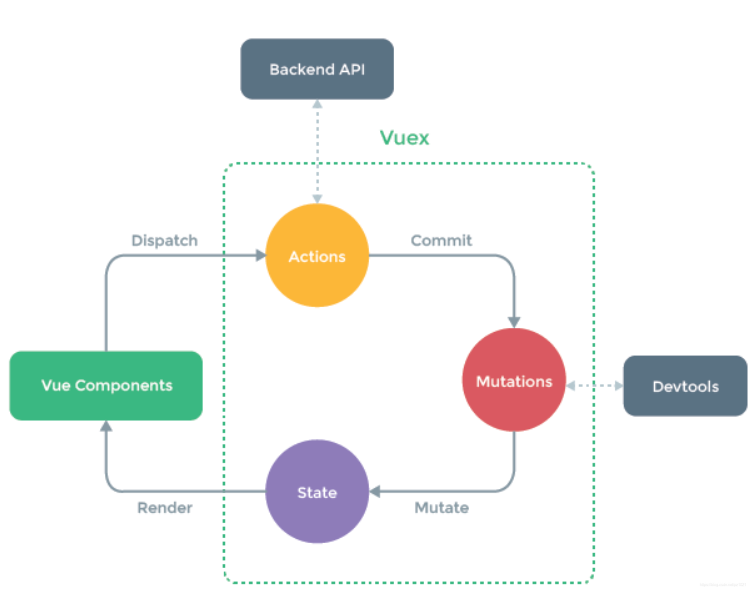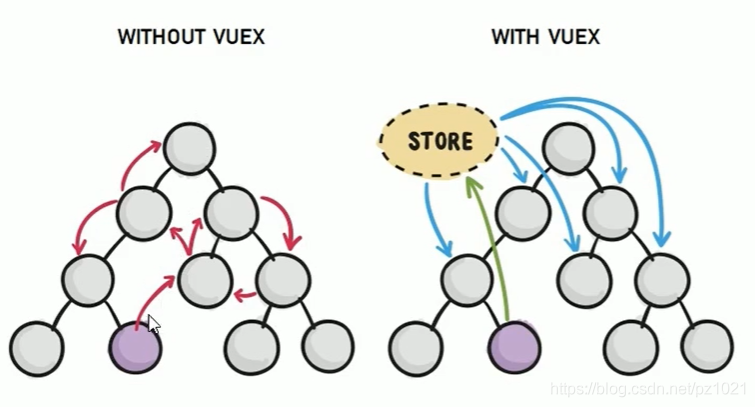# Vuex的核心概念

Vuex 是一个专为 Vue.js 应用程序开发的状态管理模式。它采用集中式存储管理应用的所有组件的状态,并以相应的规则保证状态以一种可预测的方式发生变化。他可以方便实现组件之间的数据共享。

# State
state 提供唯一的数据资源,所有的共享的数据都要统一放到store 中的state中进行存储.
# 组件中访问state第一种方式
this.$store.state.全局数据名称
1
# 组件中访问state第二种方式
从vuex中按需求导入mapState函数
import {mapState} from 'vuex'通过刚才导入的mapState函数,将当前组件需要的全局数据,映射为当前组件的computed计算属性computed :{ ...mapState(['count']) }
# Mutation
mutation用于变更store中的数据
- 只能通过mutation更Store数据,不可以直接操作Store中的数据。
- 通过这种方式虽然操作起来稍微繁琐一些,但是可以集中监控所有数据的变化。
# 触发Mutations的第一种方式
this.$store.commit()
//store.js中定义mutations
const store = new Vuex.Store({
state: {
count: 0
},
mutations: {
add(state) {
//更改状态
state.count++
}
}
})
//组件中接收触犯mutations
methods: {
add() {
this.$store.commit('add')
},
},
//mutations可以传递参数
mutations: {
add2(state,step) {
state.count += step
}
}
//触发带参数的mutation
methods: {
add() {
this.$store.commit('add',3)
},
}
1
2
3
4
5
6
7
8
9
10
11
12
13
14
15
16
17
18
19
20
21
22
23
24
25
26
27
28
29
30
31
32
33
2
3
4
5
6
7
8
9
10
11
12
13
14
15
16
17
18
19
20
21
22
23
24
25
26
27
28
29
30
31
32
33
# 触发Mutations的第二种方式:
通过以函数映射的方式
- 从vuex中按需求导入mapState函数
import {mapMutations} from 'vuex'通过刚才导入的mapState函数,将当前组件需要的全局数据,映射为当前组件的computed计算属性- 将指定的mutations函数,映射为当前组件的methods函数
methods:{ ...mapMutations(['add']) }
# action
用于处理异步任务
如果通过异步操作变更数据,必须通过Action,而不能使用Mutation,但是在Action中还是要通过触发
Mutation的方式间接变更数据。
# 触发Actions的第一种方式
this.$store.dispatch
//定义store.js 中定义action
actions: {
addAsync(context) {
setTimeout(()=> {
context.commit('add')
},1000)
}
}
//在事件方法中通过dispatch触发action
add () {
// 触发action
this.$store.dispatch('addAsync')
}
1
2
3
4
5
6
7
8
9
10
11
12
13
14
2
3
4
5
6
7
8
9
10
11
12
13
14
# 触发异步任务携带参数
mutations: {
add(state,step) {
state.count += step
}
},
actions: {
addAsync(context,step) {
setTimeout(()=> {
context.commit('add',step)
},1000)
}
}
//触发action
add () {
this.$store.dispatch('addAsync',5)
}
1
2
3
4
5
6
7
8
9
10
11
12
13
14
15
16
17
2
3
4
5
6
7
8
9
10
11
12
13
14
15
16
17
# 触发Actions的第二种方式
通过以函数映射的方式:
- 从vuex中按需求导入mapState函数
import {maptActions} from 'vuex'通过刚才导入的mapState函数,将当前组件需要的全局数据,映射为当前组件的computed计算属性- 将指定的mutations函数,映射为当前组件的methods函数
methods:{ ...maptActions(['addAsync']) }
# getter
Getter于对Store中的数据进行加工处理形成新的数据。他不会修改state中的原始数据起到的是包装数据的作用
- Getter 可以对Store中已有的数据加工处理之后形成新的数据,类似Vue的计算属性。
- Store 中数据发生变化,Getter 的数据也会跟着变化。
# 调用getters第一种方式
this.$store.getters.名字
//组件中调用
{{$store.getters.showNum}}
//store.js中定义
getters: {
showNum (state){
return `当前最新的数据${state.count}`
}
}
1
2
3
4
5
6
7
8
2
3
4
5
6
7
8
# 通过以函数映射的方式
- 从vuex中按需求导入mapState函数
import {maptGetters} from 'vuex'通过刚才导入的mapState函数,将当前组件需要的全局数据,映射为当前组件的computed计算属性- 将指定的mutations函数,映射为当前组件的methods函数
computed :{ ...maptGetters(['showNum']) }
